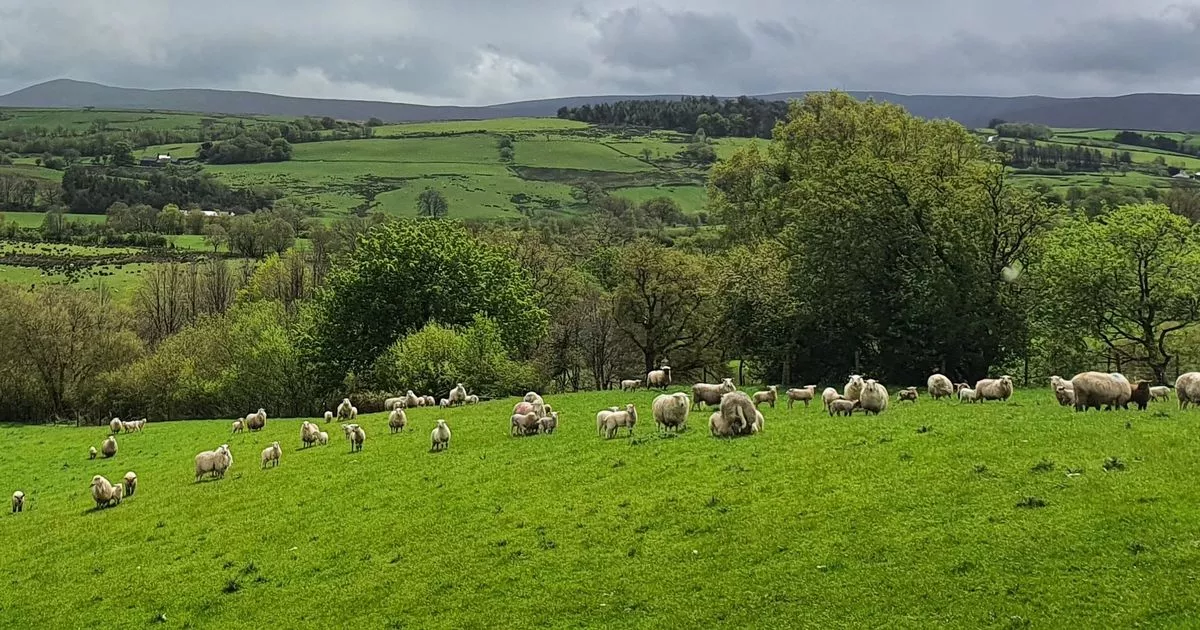By Andrew Forgrave
Copyright dailypost

New impact modelling for Welsh agriculture shows incomes could fall 16% – around £4,900 per farm – when a new payments regime starts next year . While the consequences are less severe than cataclysmic forecasts before the scheme was tweaked, farm leaders say the figures remain “extremely concerning”.
A previous iteration of the scheme led to doomsday forecasts of an 85% fall in farm incomes. Also forecasted was a 10.8% reduction in Welsh livestock numbers, along with 11% cut in job numbers.
This prompted a symbolic display of 5,500 pairs of wellies at the Senedd to represent the number of jobs expected to be lost through the Welsh Government’s Sustainable Farming Scheme (SFS) proposals.
Following protests, the scheme was altered to include a Social Value Payment and give more funding for universal payments to all farmers. A controversial requirement to plant trees on 10% of each farm was also dropped.
Latest modelling published today (Tuesday, September 30), for SFS universal actions, shows the impacts are now less severe – but they will still be profound. According to NFU Cymru, in a worst case scenario the new scheme will result in around 5% fewer livestock, 4% fewer jobs and a 16% drop in farm business incomes.
The union said the damaging forecasts show that the Welsh Government must do more to protect the industry from financial harm. NFU Cymru president Aled Jones accepted the figures were less alarming than before the scheme was revised – but he said they were still worrying. Join the North Wales Live Whatsapp community now
He called for a scheme that gives parity with the existing Basic Payment Scheme (BPS) for farmers. He said: “We have always maintained that the SFS should provide at least the same level of economic stability to Welsh farming, the supply chain and our rural communities. A move to a new scheme should not leave farmers financially worse off.”
Ian Rickman, president of the Farmers Union of Wales (FUW), estimates that, compared to previous versions of the scheme, industry impacts have now been “roughly halved”. But the implications were still “concerning,” he said.
Mr Rickman added: “Welsh farmers should not be disadvantaged for transitioning to a new system of support that places greater societal and environmental demands on their businesses.
“This is why we are calling on the next Welsh Government to increase the base-level funding of £238m for the Universal Layer by an amount that fully mitigates the estimated economic impacts.
“Based on the Welsh Government’s own assessments, this represents an increase of at least £76m.”
Huw Irranca-Davies, Deputy First Minister and Cabinet Secretary for Climate Change and Rural Affairs, stressed the modelled forecasts are not predictions of what will actually happen.
But he accepted there will be “cost to farmers” for completing required Universal Actions, which span issues like soil health, animal welfare and habitat improvements.
In a written statement, the minister said: “It is important to understand the economic modelling is likely to overestimate this (cost) because, as a static model, it does not include any of the longer term positive economic benefit to farmers from undertaking those same actions.
“The SFS supports on-farm decisions that should lead over the longer term to reduced costs, improved productivity and better environmental outcomes.
“Similarly, the modelling is likely to have exaggerated the potential changes in farm output, labour usage and FBI from the modelled potential livestock reductions.” Sign up for the North Wales Live newsletter sent twice daily to your inbox
Besides economic impacts, NFU Cymru worries about the new scheme’s red tape. The union wants Rural Payments Wales (RPW) to adopt an advisory-led approach rather than imposing “disproportionate penalties” straight away.
The union is also lobbying for an independent review looking at the cumulative burden of regulation and bureaucracy facing the Welsh farming sector.
“The new scheme is a very significant change for farmers,” said NFIU Cymru president Aled Jones, a Caernarfon dairy farmer. “We remain concerned about the level of detail, constraints, administration, costs and bureaucracy attached to the SFS, which is significant and far greater than anything seen before.”
Nature Friendly Farming Network (NFFN) Cymru welcomed the latest SFS modelling, noting that some of the forecasted falls in livestock numbers have happened already.
However it wants to see more details, especially for Optional and Collaborative payments.
Rhys Evans, NFFN Cymru manager, said these payments were vital if the industry is to transition to nature-friendly farming. But he said that, overall, the SFS is now “stronger and more accessible” than it was 12 months ago.
He added: “There seems to be an assumption that increasing habitat cover will automatically lead to a reduction in livestock numbers. Yet many habitats such as pastureland, herbal leys and agroforestry can be successfully integrated into nature-friendly livestock farming systems.
“It is also puzzling that this reduction is based on 2019 data, when livestock numbers have already fallen since then, meaning some of the estimated reductions have already occurred.”
“The future of farming in Wales lies in farmers working with nature to produce food in ways that deliver both environmental and socio-economic benefits.”
Find the weather forecast where you live



